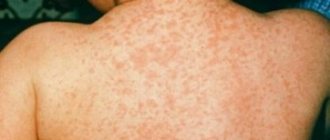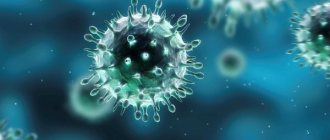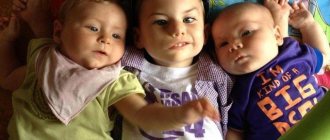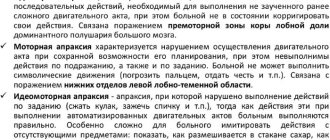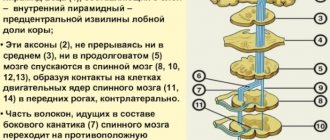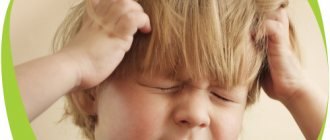Atypical autism - main symptoms:
- Mood swings
- Speech Impairment
- Irritability
- Smell disorder
- Mental development disorder
- Inappropriate behavior
- Inability to properly express your feelings
- Inability to formulate thoughts correctly
- Inability to interpret words correctly
- Inability to show emotions correctly
- Inability to express thoughts correctly
- Panic fear when being in an unfamiliar environment
- Inability to react correctly to events
- Misperception of information
- Tendency to loneliness
- Difficulty communicating with people
- Inability to independently perform household tasks
Atypical autism in children
Although signs of autism in children always appear in the first years of life, some parents may not even suspect for a long period of time that their child is different from others. If the baby suffers only from minor disturbances in the psyche and social interaction, he may develop completely normally and not give mom and dad any reason to worry, however, after some time, signs of the disease will still appear.
In this state of affairs, when symptoms of autism are detected in children over 3 years of age, they speak of an atypical manifestation of this disease.
Difference from other forms
To understand how atypical autism differs from classical autism, it is necessary to know the difference in the severity of symptoms and in the time period of the first manifestations of pathology.
With classic autism, the symptoms become pronounced starting from the first month of life, even then children develop decreased muscle tone, constant lethargy, lack of a smile and lack of attention to any attempts to lure the baby.
With atypical autism, in the first years of life the child may not have any signs of the disease. They begin to appear closer to 3 years, but the clinical picture will not be as pronounced as with the usual form.
Atypical autism in children
In this article we will tell you what the difference is between atypical autism and early childhood autism, the signs of which can be noticeable almost from the very birth of the baby.
Symptoms of atypical autism
The main symptom of such a disease as autism, in any of its forms, is a violation of social interaction. Meanwhile, if an autistic child, suffering from this disease from birth, does not try to interact with the people around him and does not see a need for this for himself, then a child with atypical autism tries to communicate with other people, but does not understand how to properly structure the process communication with others.
In most cases, atypical autism occurs without mental retardation. Such children are actively developing intellectual abilities, but it can be extremely difficult for them to apply them in practice. This may also be associated with other symptoms of the disease, namely:
- insufficient vocabulary for one's age;
- inability to understand other people's thoughts and feelings;
- inability to express one's own emotions;
- excessive irritability, intractability and inflexibility of thinking.
Unfortunately, sometimes atypical autism also occurs with mental retardation, like the main form of this disease, but this is quite rare.
Developmental prognosis for atypical autism
As a rule, atypical autism spectrum disorder does not prevent a child from developing fully. Of course, in some ways this baby will be different from his peers, but despite this, he, like everyone else, will be able to attend ordinary children's institutions.
There are currently no treatments for this disease. Meanwhile, a sick child will have to be observed by a neurologist throughout his life in order not to miss the symptoms of the disease and to promptly apply the necessary methods of symptomatic therapy.
Causes of the disease
Since the cause of the pathology is associated with structural changes in the brain, only endogenous and genetic factors can provoke the disease.
- Heredity . In the 20th century, genetic scientists discovered a gene that is responsible for the occurrence of the disease. The presence of the gene does not provide an exact guarantee for the development of pathology, but it sharply increases the likelihood of the disease in a certain person and his blood relatives.
- Other pre-existing mental illnesses . If there is already a history of diseases such as schizophrenia, epilepsy, mental retardation, then autism may develop as a consequence of these pathologies.
- Pathologies of the prenatal period . While the fetus is in the womb, you may encounter dehydration, infections, organic brain damage, that is, factors that can lead to structural changes in the brain, and subsequently to the development of autism.
Atypical autism
The last time we took Phenibut was in the fall, we didn’t notice any effect from it either, apparently we got used to it, because... he used to help. I want to cancel Sonapax, because I don’t see the point in giving something that has no effect.
I don’t know what to do next, treat the child or myself, because... My nerves are already on edge. I am very worried about autistic symptoms, which we also don’t know how to deal with today. I would be grateful if you could point us in the right direction. If I haven't told you anything yet, I'll answer your questions.
Last edited by Pchela on Tue Aug 02, 2011 4:47 pm, edited 1 time in total
I can’t speak in absentia about the correctness of the diagnosis, but the doctor’s logic is simple: this
| Bee User Registered: 07/31/2011 Messages: 4 From: Moscow |
| Added: Sun Jul 31, 2011 4:26 pm Message title: |
| I also remembered that in infancy I suffered from vomiting, but the cause was never discovered. It took about a year to pass. Neurosonography showed no abnormalities. According to the last sleep EEG (one year ago), “Diffusely moderately disorganized sleep EEG pattern. Interzonal differentiation is weakened. “Sleepy spindles” are irregular, sometimes generalized. In the left medial temporal region there is an inconsistent increase in slow-wave activity. Rare generalized bursts of nonspecific activity, d=s, and a one-time short paroxysm of polymorphic acute activity generalized in the right hemisphere are recorded. Signs of dysfunction of the median and subcortical structures. Signs of dysfunction (immaturity) of cortical-subcortical interactions. There is no typical epileptic activity. The changes are not sufficient to judge from the EEG a decrease in the threshold of convulsive readiness.” |
| drLev Doctor Registered: 03/23/2004 Messages: 1483 From: Moscow |
| Added: Mon Aug 08, 2011 9:41 am Message title: |
| 1. What do other specialists say - child psychiatrist and pathopsychologist? What are the neurological profile indicators and who prescribed psychotropic drugs, in particular Finlepsin and Sonapax? Prescribing antipsychotics is definitely not within the competence of a neurologist... 2. |
| Quote: |
| the neurologist mentioned atypical autism. Why atypical? |
| Quote: |
| The cars are turned upside down with their wheels, which he spins and mutters his “spells”: whether it’s spinning or not spinning. Juice tubes stick out from the cars, imitating the dripping of a kondeya. The lids from the pots are placed in a row on the floor and rotated. We try to twist everything that is round. Added a desire to streamline “life” by arranging cars in a row, wearing only green shorts and T-shirts |
very similar to pathological stereotypical actions, characteristic, among other things, of autism spectrum disorders. This
| Quote: |
| very sociable, easily makes contact even with strangers, and likes to play with children. Smart, observant, quick-witted. The head works well. Good memory, notices little things |
stands out from the diagnostic stereotype of pathology that is fashionable today. Therefore - “atypical”. 3.
| Quote: |
| I would be grateful if you could point us in the right direction |
a competent child psychiatrist is the right direction 4. You write “the treatment does not help.” You simply haven’t had any systemic and comprehensive treatment yet. _________________ Consultations MD Perezhogina L. O. (drLev) https://www.drlev.ru/help.php
first of all - clinical observation by a psychiatrist
| Bee User Registered: 07/31/2011 Messages: 4 From: Moscow |
| Added: Tue Aug 09, 2011 8:36 pm Message title: |
| We saw a neurologist about hyperactivity and periodic hysterics. The neurologist prescribed us Phenibut and Pantogam. She did not refer us to a psychiatrist. only to a geneticist. She didn't pay attention to my stories about air conditioners. She said - switch. It was not possible to switch. On Phenibut the child was calmer, and on Pantogam his speech developed better. After some time, we turned to another neurologist. Then the assumption “atypical autism” was already made. Our complaints, in addition to the air conditioners, were that the child had become uncontrollable, hysterics appeared again for any reason, he was constantly on the move, constantly running somewhere, full of emotions, did not respond to prohibitions, did not obey, any new environment was overstimulation. Those. everything I wrote about above only makes the situation worse. In order for the child to become calmer, more adequate and controllable, Finlepsin was prescribed, and if this does not help, Sonapax was prescribed. Neither one nor the other helped. Again they did not refer me to a psychiatrist. I had already decided for myself, after reading about autism and seeing how the child’s behavior had changed for the worse, that I needed to see a psychiatrist. What examinations do you recommend? And what can you say based on the conclusion of the last EEG? |
| drLev Doctor Registered: 03/23/2004 Messages: 1483 From: Moscow |
| Added: Tue Aug 16, 2011 10:24 pm Message title: |
| Quote: |
| What examinations do you recommend? |
| Quote: |
| And what can you say based on the conclusion of the last EEG? |
EEG of an immature brain with a high risk for the formation of paroxysmal activity - in principle, it fully corresponds to your description of the clinic _________________ Consultations by MD. Perezhogina L. O. (drLev) https://www.drlev.ru/help.php
Sorry, Bee, on principle I’m not advertising anyone here, not even myself. 18 hospital is still more focused on neurological pathology, it is better for you to contact either the 6th Children's Hospital or one of the clinical centers - National Center for Healthcare of the Russian Academy of Medical Sciences or the Research Institute of Psychiatry - or the departmental doctors 1-2-3 med. Institute, RMAPO. This doesn't guarantee that you'll see a great doctor, but it does improve your chances. Please note: have a referral from the clinic! _________________ Consultations MD Perezhogina L. O. (drLev) https://www.drlev.ru/help.php
Atypical autism
is a pervasive developmental disorder resulting from a disorder of brain development and characterized by severe and pervasive deficits in social interaction and communication, as well as restricted interests and repetitive activities. Differs from childhood autism (F84.084.0) either by a later age of onset (after 3 years) or by the absence of at least one of the main diagnostic criteria (stereotypes, communication disorders).
Often found in children with profound mental retardation and in persons with severe specific disorder of receptive language development.
At what age is autism diagnosed?
The average age of a child when parents are notified of the diagnosis is three to four years. In fact, the fact that a child is autistic is noticeable much earlier - already at one year of age one can definitely say about the presence or absence of autistic traits. Attentive parents are wary of the fact that at one year old the baby does not pronounce the simplest words, although according to neurological developmental standards he should already be able to pronounce them. It is optimal if the child goes to a psychologist and begins regular classes with a defectologist at the age of about two years.
The sooner parents seek advice on aspects that concern them in their child's behavior, the better. Modern psychologists use the ATEK test for diagnosis, which will help identify the degree of autism and predict the further development of the child.
Alas, almost all mothers are distrustful of child psychiatry, and they are simply afraid to take their child to an appointment. They are worried that they will hear an unpleasant diagnosis and that psychotropic medications will be prescribed. This approach to health is unacceptable - every month of delay in diagnosis is important, since the child does not receive adequate therapy and does not attend the classes necessary for him.
Diagnostic criteria
To be diagnosed with atypical autism, the condition must meet the following criteria:
- Abnormal or disrupted development begins at age 3 years or older (autism criteria other than age of onset).
- Qualitative impairments in social interaction or qualitative impairments in communication, or restricted, repetitive and stereotyped behaviors, interests and activities (criteria for autism, although a minimum number of areas of impairment does not have to be met).
- Diagnostic criteria for autism (F84.0) are not met.
Original text
(English)
- A.
What is atypical mental retardation
Presence of abnormal or impaired development at or after age three years (criteria as for autism except for age of manifestation).
— International Classification of Diseases, Tenth Revision (ICD-10)
Mental retardation is coded as follows:
- F84.11 Atypical autism with mental retardation (includes mental retardation with autistic features.)
- F84.12 Atypical autism without mental retardation (includes atypical childhood psychosis)
Differential diagnosis
Unlike atypical autism, Asperger syndrome does not experience delays in speech and cognitive development. Differential diagnosis with schizophrenia is carried out as with childhood autism.
Diagnostics
Due to the non-specificity of the clinical picture, making a diagnosis is quite difficult and impossible in one or two days. In this case, a thorough clarification of the current clinic, collection of personal and family history, observation of the child’s behavior in society and in his usual conditions is required.
Making a correct diagnosis includes a comprehensive medical and psychological examination of a child or adult. Routine laboratory tests are not required, but your doctor may order a CT scan or MRI of the brain. Diagnosis necessarily includes psychiatric testing.
Differential diagnosis is carried out regarding diseases such as:
- schizophrenia;
- autism;
- Asperger's syndrome;
- Down syndrome.
Based on the results of the examination, the most effective treatment tactics in this clinical case will be chosen.


